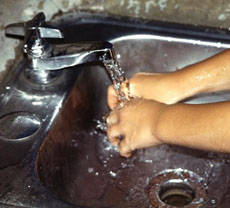Prepared by
Diane Ball Linder, Ed D, LDN, RD
According to the U.S. Centers for Disease Control and
Prevention, handwashing is the single most important means of preventing the spread of
infection.
|
|
HANDWASHING
 Helping to Prevent the Spread of Infection Helping to Prevent the Spread of Infection
According to the U.S. Centers for Disease Control and Prevention, handwashing is the
single most important means of preventing the spread of infection. Poor handwashing
contributes to millions of cases of food poisoning every year.
The following true story is an example of the importance of proper handwashing:
- Fifteen children in Atlanta became sick with food borne illness during the
Thanksgiving-Christmas holiday season. They suffered fever, diarrhea and abdominal pain.
All the children had eaten chitterlings, (pork intestines), a common part of holiday meals
for some people. The raw chitterlings had been infected with bacteria that cause illness.
The chitterlings had been prepared by someone who had not washed their hands after they
cleaned them. That person then touched the children or something used by the children,
such as toys or bottles. Also, the person allowed the children to touch the raw
chitterlings.
-
- The disease-causing bacteria was transferred from the raw chitterlings to the children
through contact with the hands of the people preparing the food.
 Here is an
example of the importance of handwashing after handling pets (this is also a true story): Here is an
example of the importance of handwashing after handling pets (this is also a true story):
Fifteen premature babies in a hospital became sick with a fungus. The babies had gotten
the fungus from hospital workers who had petted dogs. The workers had not washed their
hands after they petted the dogs and before handling the babies.
What You Will Learn
- The importance of handwashing
- The High Five: Five steps to washing hands effectively Five times to be especially sure
to wash hands
- Whether antibacterial soaps are a good choice.
When Should You Wash
Your Hands?
- 1. After playing outside.
- 2. After you sneeze.
- 3. Before you eat.
- 4. After bathroom trips.
- 5. After playing with pets.
 Issued in furtherance of Cooperative Extension
work, Acts of Congress of May 8 and June 30, 1914, in cooperation with the United States
Department of Agriculture. The Louisiana Cooperative Extension Service provides equal
opportunities in programs and Issued in furtherance of Cooperative Extension
work, Acts of Congress of May 8 and June 30, 1914, in cooperation with the United States
Department of Agriculture. The Louisiana Cooperative Extension Service provides equal
opportunities in programs and
employment. Information and Graphics on this site are
copyright protected by LSU Agricultural Center's Louisiana Cooperative Extension Services.
For more information on the EFNEP program, contact EFNEPMail@agcenter.lsu.edu. |